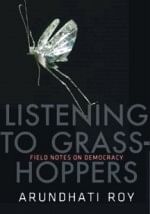| Book Review
India Shining?
TARQUIN HALL
 |
Listening to Grasshoppers
by Arundhati Roy
Hamish Hamilton £14.99 pp304 |
Once I interviewed a senior economic adviser to the Indian government. When I challenged his view that India would soon be a “superpower” and referred to the country's 600m poor, he shot me a venomous look: “You've been listening to Arundhati Roy!”
That Roy should be perceived as having singlehandedly coloured a foreign journalist's perception of India is laughable. Away from the gated communities of the middle classes, the country's problems are palpable. But no other Indian activist writes in such articulate English or attracts such attention in the West as the Booker prize-winning author of The God of Small Things. Having spent the past 12 years using her literary fame to shine a light on the country's poor, she is seen by the elite as a veritable traitor.
Roy's new book, in which she argues that a nexus of government, judiciary, industry and media is colluding to absolve each other's sins, will not make her any new friends in such circles. No doubt the cheerleaders of the “new” India will dismiss these essays as the ravings of a woman who, in the words of the economic adviser, “will be out of a job when the Indian economy is bigger than America's”. Those outside the country who have grown used to reading about the success of corporate India are also likely to question its realism.
Roy readily admits that she is “hysterical” about where Indian society is headed: “I'm screaming from the bloody rooftops.” In her view, “genocide” was committed in the Gujarat riots in 2002, Kashmir is under brutal military occupation and economic policies have driven millions to the brink of starvation. As for last November's Mumbai attacks: “What we're experiencing now is blowback, the cumulative result of decades of quick fixes and dirty deeds. The carpet is squelching under our feet.”
Hyperbole? Her razor-sharp diatribes are threatening precisely because they are so well reported and because she is so passionate about India's future -- a future that is being sabotaged, in her view, mainly by religious nationalism and political expediency. One case in point is the story of Mohammad Afzal, a Kashmiri sentenced to death for the 2001 attack on India's parliament. Roy meticulously picks apart the bizarrely constructed case against him, based on circumstantial evidence, and sees the frenzied calls to hang him as an example of growing Hindu chauvinism: “If opinion polls, letters to the editor and the reactions of audiences in TV studios are a correct gauge of public opinion in India, then the lynch mob is expanding by the hour. It looks as though an overwhelming majority of Indian citizens would like to see Mohammad Afzal hanged every day, weekends included, for the next few years.”
Roy also chronicles the alarming abuses by India's Supreme Court. One former chief justice was accused of allowing his sons to run a property empire from his official residence and profit from his court decisions. But the hapless Indian journalists who reported the story were found guilty of criminal contempt under an act that essentially prohibited criticism of the court or any of its justices.
But she saves her most devastating criticism for those involved in the killings of 2,000 Muslims in Gujarat in 2002. Roy compares the Hindu right wing's persecution of Muslims to Hitler's persecution of the Jews. “What kind of India do they want? A limbless, headless, soulless torso left bleeding under the butcher's cleaver with a flag driven deep into her mutilated heart?”
Ultimately, Roy identifies the very democratic system India brandishes to the rest of the world as the underlying problem. It's true, Indians are free to vote. But what connection, Roy rightly asks, does voting have with democracy when politics have mutated and justice is consistently subverted? Can Indians claim moral superiority when the highest judges in the land engage in brazen corruption; when the police boast of torture and routinely fabricate evidence to frame the innocent; when corporations commit “ecocide” in their quest for bigger profits?
“We're standing at a fork in the road,” Roy exhorts her fellow citizens. “One sign points in the direction of Justice, the other says Civil War. There's no third sign, and there's no going back. Choose.”
Copyright
(R) thedailystar.net 2010 |
